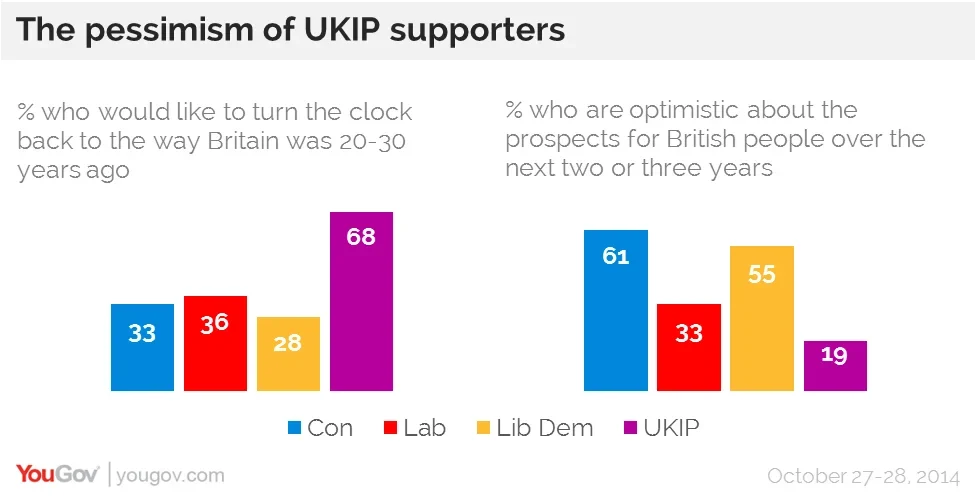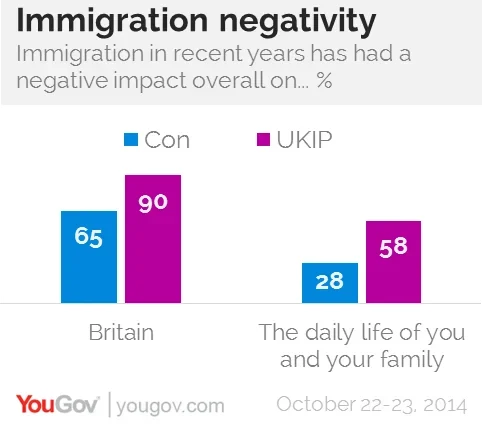Mr Farage's opponents try to neutralise his appeal by offering policies for a better tomorrow – but what Ukip’s voters want is a programme for a better yesterday
Most Ukip voters want to emigrate. Their problem is how to get there. Their nation of choice does not receive British Airways flights. It cannot be found on any map. Even Nigel Farage cannot really help them.
The place where Ukip voters want to live is that other country, the past. By four-to-one, they would prefer to turn the clock back 20-30 years rather than continue to live in Britain as it is today. No other party’s supporters think that.
This finding, from a special YouGov survey for The Times, helps to explain why Mr Farage’s opponents find it so hard to fight him. They try to neutralise his appeal on Europe and immigration by offering policies for a better tomorrow – when, at heart, what Ukip’s voters want is a programme for a better yesterday. Like Peter Finch’s character, Howard Beale, in the 1976 film, The Network, they are as mad as hell and don’t want to take it any more.
At the root of this anger is a profound pessimism about Britain’s future. Only 19 per cent of Ukip voters are optimistic about “the prospects for British people over the next two or three years”. In contrast, 61 per cent of Conservatives are optimistic. It may have been true once that Ukip voters were like Tories, only a bit more hostile to Europe and immigrants. No longer. The difference between the two groups is now profound.

The clearest expression of this is, of course, immigration. Fully 90 per cent of Ukip voters say it has had a negative impact on Britain, while a clear majority, 58 per cent, say it has been bad for their own family’s daily life. Most Tory loyalists are also troubled by immigration’s national impact, but only 28 per cent say their own family is suffering on a daily basis.

To find out what is going on, we asked those Ukip supporters who told us their own families’ daily lives were blighted by immigration – 149 of respondents in a total poll of 2,020 people – to describe its impact in their own words.
Some gave us specific examples: “When I visit my family in Birmingham I get scowled at by Asian Muslims on the train.” “Terrible life due to immigrant neighbours who have stolen from us. They have loud parties every day with 15 occupants living in a two-bedroom flat.” “My grand-daughters are having difficulty getting into nearby, overcrowded schools full of kids not born in the UK and for whom English is not their first language.”
The striking thing, however, is that these personal stories are in a small minority. The vast majority of responses suggest that hostility to immigration is driven by a general climate of fear and suspicion more than by specific experiences. Four themes recur time and again:
- Public finances. A typical example: “Too many people from the poorer EU countries sponging off the British economy and the taxpayer”
- Jobs: “Low-skilled jobs have been filled by immigrants at or below the minimum wage.”
- Access to public services: “NHS suffering, schools overcrowded. Houses in short supply”
- Culture: “We’ve got an exponentially increasing number of angry Muslims who refuse to share our values, menacing our streets. Some English cities are now lost to civilisation and more will follow”.
Such a climate of fear is hard to counter. Official statistics and academic studies clearly cut no ice. Of 2.3 million immigrants from the rest of the EU, just 60,000 – less than three per cent – claim unemployment benefits such as job-seeker’s allowance. The typical Ukip voter says the figure is half a million. One recent study from economists at University College, London, says that recent immigrants pay in far more in taxes than they receive in benefits. One in four NHS doctors come from overseas.
In other words, far from “sponging off the taxpayer” and adding to NHS waiting lists, the overall impact of immigration has been to help keep taxes down and the NHS running. Most Ukip supporters simply don’t believe it.
What, then, can Ukip’s opponents do? The starting point is to recognise that Ukip’s voters in Clacton last month and Rochester this week can be divided into two broad groups. A minority are so fearful and pessimistic that virtually all they care about is (as they see it) Britain’s immigration-induced decline. They make up around ten per cent of all voters nationally. They want to pull up the drawbridge and keep out the rest of the world. They don’t really care whether David Cameron or Ed Miliband is Prime minister next summer.
Then there are the extra voters who backed Ukip in this May’s European Parliament elections (when the party won 27 per cent) and the Clacton by-election (58%), and are supporting Mark Reckless in Rochester and Strood this week. These are like the protest voters who used to give the Liberal Democrats startling by-election victories. It wasn’t that people then were passionately for Europe and proportional representation, just that they were fed up with the main parties.
A lot of today’s protest voters are queasy about the level of immigration, but they are less obsessed with it. In a general election they will care who governs Britain. A party can woo these voters by showing that it knows how to sort out the NHS, improve schools, help youngsters get jobs and homes and generally raise living standards.
The wrong way to fight Ukip is to accept its agenda and fight on its ground. Its core ten per cent is probably lost to the traditional parties, at least until living standards improve significantly. Ukip’s rivals should concentrate on the other 90 per cent – the people for whom immigration is often a worry to be sure, but not the be-all and end-all of their political outlook. The more the traditional parties say, in effect, “Ukip is right to bang on about immigration, don’t vote for it”, the worse they will do. For the moment, too many politicians who should know better are simply fighting the wrong battle.
See the full poll results here and here
This analysis appears in today’s Times









